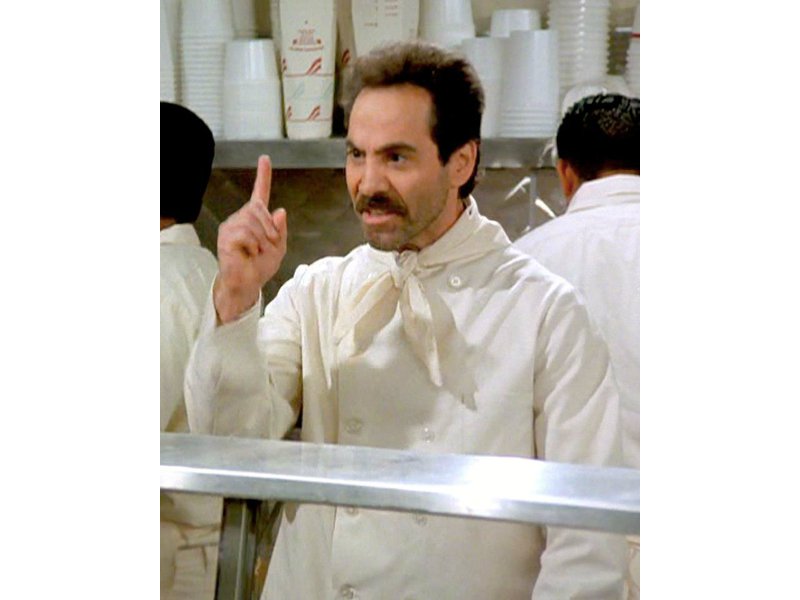In a bizarre story coming out of Russia a couple of months ago (and no, it wasn’t in April), government officials in their zealous drive to purge the country of any symbols or supporters of fascism and Nazism went after a language pedant, probing his links with “grammar Nazis”. According to the Moscow Times, “prosecutors in southern Russia … summoned for questioning Alexei Pavlovsky, the head of Bonus Media, which supports the local branch of the popular Total Dictation educational project. The project tests how accurately people can transcribe a text read orally. “They asked me first about the dictation, about my other civil initiatives, and then politely inquired about what I knew about grammar Nazis, and whether they were financing my activities,” Pavlovsky wrote on his Facebook page.”
It does make you wonder just how right or OK it is for the word Nazi — a name with such abhorrent associations — to be appropriated for more benign or jokey purposes.
“Soup Nazi” was the nickname given to a character in the wildly successful U.S. TV sitcom Seinfeld. So named because of the fictional soup purveyor’s extreme and ridiculous rules he imposed on his customers, the Soup Nazi lives on in many people’s memories — including that of Ali “Al” Yeganeh, the Original Soup Man of New York City, who is said to have been the inspiration for the TV character.
According to Seinfeld writer Spike Feresten, Jerry Seinfeld and several members of the program’s production team went to Yeganeh’s soup joint for lunch a few weeks after “The Soup Nazi” episode (which introduced the character) first aired. On recognizing Seinfeld, Yeganeh apparently hurled profanities and demands for apologies at the comedian-producer, claiming his business had been ruined by the creation of the fictional food-tyrant. Yeganeh has banned any Soup Nazi references by franchisees and their staff, and he vehemently discourages his franchise owners from making references to Seinfeld in their promotional and marketing activities. His “media rules” (according to his website) forbid mention of “the ‘N’ word”.
Oxford Dictionaries gives the “N word” two definitions: 1) “A member of the National Socialist German Workers’ Party” [after whose name in German the 1930s acronym grew], and 2) “A person with extreme racist or authoritarian views; A person who seeks to impose their views on others in a very autocratic or inflexible way.” Like it or not, Nazi is here to stay as a generic term in our language.
Rather unfortunately, that second meaning of Nazi sticks stubbornly to a particular category of people who “seek to impose their views on others in a very autocratic or inflexible way”. Grammar Nazis, benign as they really are, seem to be the 21st-century’s most widely despised and referenced group of active “Nazis”, and it seems it’s not a nickname that’s going away any time soon.
Fortunately, however, this particular type of person goes by other names too. As David Foster Wallace was quoted as saying in Harper‘s magazine in April 2001: “There are lots of epithets for people like this – Grammar Nazis, Usage Nerds, Syntax Snobs, the Language Police. The term I was raised with is SNOOT. The word might be slightly self-mocking, but those other terms are outright dysphemisms. A SNOOT can be defined as somebody who knows what dysphemism means and doesn’t mind letting you know it. … . . . A fellow SNOOT I know likes to say that listening to most people’s English feels like watching somebody use a Stradivarius to pound nails.”
Comparing someone to an uncouth violin-wielding carpenter is much less offensive — in my opinion — than giving them the same name as one of Hitler’s henchmen. So perhaps we should go easy on the SNOOTs and pedants among us and think twice about what we call those obnoxious language police, even in jest. And by the way: I have no idea what dysphemism means, but I’m going to go and look it up now …
~~~~~~~~~~~~~~~~~~~~

